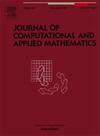大规模风险规避多阶段随机规划问题的定量稳定性与k-介质聚类相结合的场景树约简算法
IF 2.6
2区 数学
Q1 MATHEMATICS, APPLIED
Journal of Computational and Applied Mathematics
Pub Date : 2025-09-26
DOI:10.1016/j.cam.2025.117107
引用次数: 0
摘要
本文从风险规避多阶段随机规划的数量稳定性出发,提出了一种新的情景树约简框架。首先建立了风险规避型多阶段随机规划问题的定量稳定性定理,然后根据得到的定量界建立了一般的情景树约简模型,最后导出了多阶段随机规划问题在约简情景树下的最优值与原始情景树下最优值偏差的误差界。此外,我们引入了一个新的距离来衡量不同节点之间的相似性,并分别利用k- medioid和局部搜索框架开发了两种场景树约简算法。所提出的场景树约简算法可以有效地控制由于场景树约简导致的优化问题的最优值/决策误差。此外,这些算法的计算成本低,可以求解具有多阶段的大规模风险规避多阶段随机规划。最后,通过一系列数值实验验证了所提场景树约简算法的优越性。本文章由计算机程序翻译,如有差异,请以英文原文为准。
Scenario tree reduction algorithms combining quantitative stability with k-medoids clustering for large-scale risk-averse multi-stage stochastics programming problems
In this paper, we propose a novel scenario tree reduction framework derived from the quantitative stability of risk-averse multi-stage stochastic programs. We first establish the quantitative stability theorem for risk-averse multi-stage stochastic programming problems, a general scenario tree reduction model is then developed from the obtained quantitative bound, and finally we derive an error bound on the deviation between the optimal value of the multi-stage stochastic programming problem under the reduced scenario tree and that under the original scenario tree. Additionally, we introduce a new distance to measure the similarity among different nodes, and develop two scenario tree reduction algorithms utilizing the -medoid and local search frameworks, respectively. The proposed scenario tree reduction algorithms can effectively control the error in the optimal value/decision of the optimization problem caused by the scenario tree reduction. Moreover, the low computational cost of these algorithms allows one to solve large-scale risk-averse multi-stage stochastic programs with many stages. Finally, a series of numerical experiments are carried out to demonstrate the superiority of proposed scenario tree reduction algorithms.
求助全文
通过发布文献求助,成功后即可免费获取论文全文。
去求助
来源期刊
CiteScore
5.40
自引率
4.20%
发文量
437
审稿时长
3.0 months
期刊介绍:
The Journal of Computational and Applied Mathematics publishes original papers of high scientific value in all areas of computational and applied mathematics. The main interest of the Journal is in papers that describe and analyze new computational techniques for solving scientific or engineering problems. Also the improved analysis, including the effectiveness and applicability, of existing methods and algorithms is of importance. The computational efficiency (e.g. the convergence, stability, accuracy, ...) should be proved and illustrated by nontrivial numerical examples. Papers describing only variants of existing methods, without adding significant new computational properties are not of interest.
The audience consists of: applied mathematicians, numerical analysts, computational scientists and engineers.

 求助内容:
求助内容: 应助结果提醒方式:
应助结果提醒方式:


